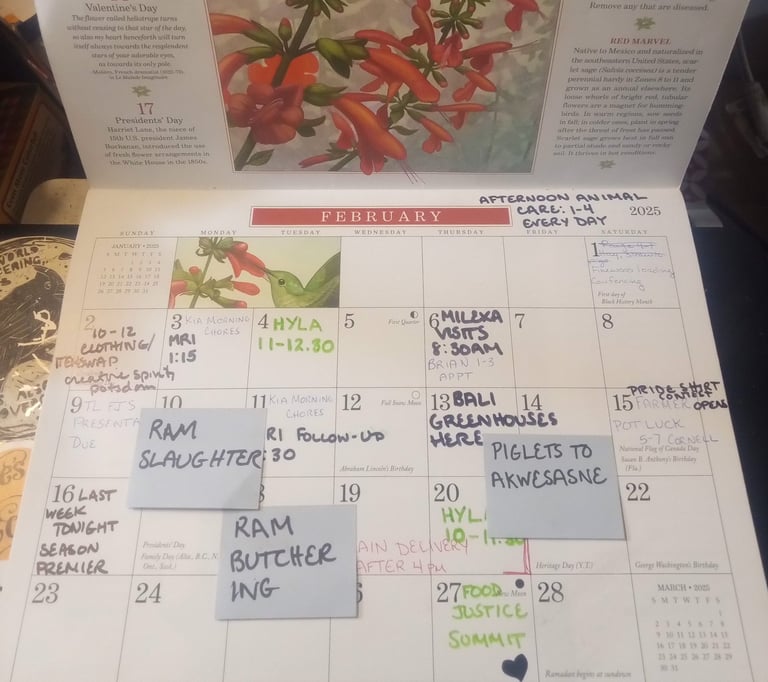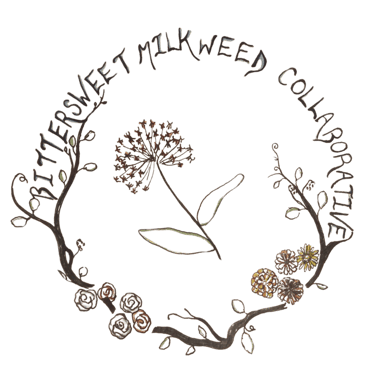Beginnings, Collaborations, and Invitations for 2025 at the Farm
January Reflections
Kia-Beth Bennett
2/4/20256 min read


Hey folks,
Lately I’ve been sending out newsletters filled with philosophy, cool farm stories, or tangible, beautiful examples of interconnectivity. This month (meaning January, which I acknowledge was a few days ago), I’d like to try something a little different. I’d like to talk about our plans for the year, the changes we’re making, and to extend a couple invitations.
The first invitation is one about which I am very excited: On February 27th, from 8 to 4, our area’s Food Justice Summit is happening. Launched by the Adirondack Food System Network, the Summit is a day of connections, conversations and inspirations centered around creating a shared, healthy, community food web. It’s taking place at the Wild Center in Tupper Lake. And this year, one of the discussions will be led by myself and my friend Hyla Howe. We’ll be presenting on manageable, low-demand, small-farm ecology and conservation practices. We’ll focus on different ecosystems and native species, particularly birds. Hyla, being the grassland bird biologist at Mass Audubon, will talk about the specifications of bird habitats and needs, and I’ll present what I’ve done here at the BMC to enhance species’ and whole-farm ecology. The conversation will end with an open floor for questions, comments and thoughts. I’m thrilled for this opportunity in large part because it’s been almost three years in the making – Hyla and I first vaguely connected when I applied for her Farmer-to-Bird grants in 2023, then we met for the first time at last year’s Food Justice Summit. And now we’re here, a couple of Bird Nerds, ready to share our love of healthy rotational grazing practices. So cool.
Anyway, y’all should come! The Summit “entrance fee” is on a sliding scale, and no payment is required. Anyone who wants can hitch a ride with me, or I can help you find a ride in the New York/Vermont area. There’ll be great people, good food, and wonderful conversations. Maybe you’ll even make some new friends there.
The other invitation is more open-ended, and related to this year’s farm changes. We’ve consistently welcomed volunteers since 2003, but over time, became overwhelmed by folks showing up without notice, at random hours, unprepared for the weather and wanting only to do specific tasks. Don’t get me wrong – volunteers and the greater community are a vital, amazing, heartwarming part of this farm. People have cuddled piglets, bottle-fed lambs, shoveled compost, driven tractors, seeded tomatoes, and shared laughter, tears and exhaustion across a table of my mother’s soup, bread and warm coffee cake. Noteworthy stories include that time Drew realized the roads were unsafe to drive and simply lay down on the kitchen floor to sleep, or the night Taylor smoked herself (via woodstove) out of the cabin three times, or the day that a group of college students returned to campus for a fancy dinner with their shirts turned inside out, so that fellow guests couldn’t see the pig mud on their clothes. Heck, the new barn we built last fall was marked out and raised by some amazingly mathematically-talented volunteers. But I’m continuously learning to set boundaries, and I chose to stop advertising volunteer hours in 2023 and 2024. We worked strictly with three college organizations, two of which came once a week, every week, and were incredibly passionate about The Work.
After witnessing how well that went, I’m ready to reopen the farm. Every Friday, Saturday and Sunday now has open volunteer hours. Folks can come from 9am to 12pm or 1pm to 4pm. A three-hour shift prevents burnout and overwhelm both for volunteers and ourselves. We can connect, teach and achieve our mutual goals while still providing space for meals, rest and simple socialization. And you’re invited! Dress for the weather, be prepared for the unexpected, and if you can give us a day’s notice before you arrive, that is greatly appreciated. My email is milkweedtussocktubers@gmail.com and my cell number is (315) 777-7245.
Along those lines, our collaborations across the board are becoming more defined. I love a good, organic, flowing relationship, spontaneous connections and spur-of-the-moment gift-giving. But now I’m diving into my natural love of calendars, scheduling butcher dates, chick arrivals, doctor’s appointments, greenhouse cleaning days, birthday parties, and potlucks in deliberate conjunction with other farms. Nursery Hill Homestead has the same kind of marked-up calendar, and we’re using those schedules to coordinate monthly get-togethers. We’re sharing the responsibilities of seed ordering, garden planning, food growing and infrastructural development, so that each farm can thrive. For instance, I have no practice growing beets, and I work with clay soil that is not super beet-friendly. Dean and Bali, however, grow enough beets to feed a small village. So this year, they’ll grow extra beets, I’ll grow some other vegetable, and we’ll swap in the fall. We’re doing the same with squash varieties. I’ll help them mulch their tomatoes, and they’ll help me install new fences. Our mutual friend Ashley might grow Tulsi for us all to have tea, and I’ll provide her with garlic. I think – just maybe – that it’s actually working. That our consistent faith in a different, better world, and our discipline in creating that world, is really creating positive change.
That doesn’t mean it’s an easy shift. A farm in transition is a farm with a lot of death and turnover. I’ve got some very elderly sheep who are probably in their final years. The pigs’ genetics are becoming too closely related and we’ll need a new boar soon. And by golly, the paperwork I did throughout January was enough to turn heads. But we are making progress. I’ve moved all lambing to September and October, to prevent selenium deficiency in the babes. All pig births will happen between April and October, to reduce difficulties during cold weather. Brian admitted he doesn’t really want to butcher chickens between October and mid-April, and we chose when we’ll receive chicks and how many we’ll need to provide everyone with eggs and meat. I’m planning some intensive gardens of corn, beans, squash and sunflowers for the animals to feast, because I want to enhance their diets and further close that fodder-animal circle. Ninety to one hundred percent of the butchering will take place either on-farm or within the local community, rather than shipping animals to slaughterhouses. We’ll open an unmown hayfield to the cows, so we can restore that ecosystem. And I am taking more time to enjoy sewing, reading, writing and drawing these days.
Financially – well, it is the beginning of the year, when I should be thinking about that stuff. Truth is, I don’t have a clue. Since that newsletter in August, when I announced our steps into the gift ‘economy’, I’ve reflected a lot. So much good has come from that change in perspective. We replaced the “For Sale” sign at the farm stand with one stating that everything offered “…is a gift. Pay what you can or accept, with no charge, what you need.” In December, we received a truckload of unneeded fencing supplies from our friends the Akins, just because we had the courage to ask. And those supplies made it possible for us to sort and butcher Jayce and Fiddlehead, whose meats were then shared with even more folks. I really love that. We’re always going to be a part of the gift economy. Farm policy will always, always be to freely share food, animals, space, time, knowledge, support and care. Focusing on that is why our intentional collaborations are expanding.
A gift economy isn’t centered around giving physical items (though that is involved). It’s centered around mutual care, and the giving of ourselves. What is most important is that we take care of each other, in whatever form that may require. Some of us might need food, or companionship, or late-night phone calls. Someone might need a ride to the doctor, or money for their mortgage, or help moving.
What I need right now is a healthier social life and a consistent-enough flow of funds to pay my monthly expenses. What the farm needs is more joy, more people giving pigs belly rubs, and a consistent-enough flow of funds to pay the monthly feed bill. Since Ann passed one year ago, we really haven’t had monetary income, for a variety of reasons. And it’s only been five months – only five! – since we committed to that gift economy mindset. So much is going well. But taking care of each other, and ourselves, still involves money. Specifically, $19,800. So this year, as we continue giving, we’ll also continue receiving money for piglets, plants, meats and produce that happen to be sold, and I’m persistently exploring paid writing opportunities. I don’t know that it’ll be enough. To be honest, I don’t think it will. But I’m keeping the faith.
If you’re moved to support our work financially, an easy way to do that is to upgrade to a paid subscription to this newsletter through Substack for $5/month or $40 for the year. Or you can reach out to me directly.
However you choose to engage with the farm is meaningful. In the midst of moving cattle, butchering rams, and sorting potatoes, it’s heartening to know that folks are reading these posts, sharing their thoughts, and showing up in their own ways. I hope that as this year moves forward, we will continue finding new and nourishing ways to support one another.
In love and solidarity,
Kia-Beth
Pronouns: they/zi (What is this?)
Bittersweet-Milkweed Collaborative Farm
